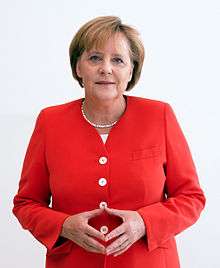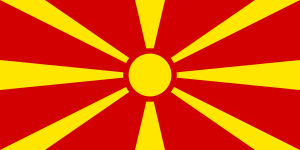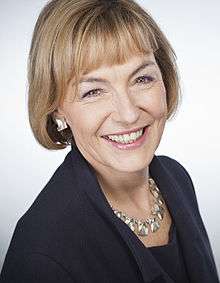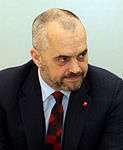2014 Conference of Western Balkan States, Berlin
| Conference of Western Balkan States Change Through Meetings[1] | |
|---|---|
| Host country | Germany |
| Dates | 28 August 2014 |
| Cities |
|
| Participants | |
| Chair |
Angela Merkel (German chancellor) |
| Follows | first conference |
| Precedes | 2015 Western Balkans Summit, Vienna |
| Key points | |
Conference of Western Balkan States was a 28 August 2014 conference of heads of states and governments of Western Balkans region initiated by German chancellor Angela Merkel. An idea for organization of conference came in light of the celebration of the 100th anniversary of the beginning of World War I.[1] It is the first conference in this framework and organizers expressed their desire to continue it in future with Vienna and Paris mentioned as a potential next hosts after Berlin (so called Berlin Process).[2] Günther Oettinger confirmed at conference that event will be organised annually with Vienna as a host city in 2015 and Paris in 2016.[3]
The German chancellor announced intention to organize a conference on 7 June 2014.[4] Invitation for participation was sent to all the countries of South Eastern Europe including Croatia and Slovenia that were already members of the European Union at the time of conference.[4]
The main intention was to show commitment for process of Future enlargement of the European Union, little progress of Bosnia and Herzegovina and Macedonia in that process and relations of Serbia with Russia in the light of International sanctions during the 2014 pro-Russian unrest in Ukraine.[4]
During the Foreign Ministers’ segment, Albanian Foreign Minister Bushati underlined the importance of making this initiative periodical, as well as finding the right instruments to enable, in future years, the drafting and implementation of concrete joint projects in the region. In this regard Albanian delegation presented a document under the title “Albanian Working Paper for the Western Balkans Conference in Berlin”, which is based in the vision of “a region in peace and well prepared to join the European Union, by guarantying a dignified living for all its citizens." [5]
At conference was announced future visit of Albanian Prime Minister Edi Rama to Serbia. It will be the first meeting of this type between two countries after 1947 meeting of Enver Hoxha with President of Yugoslavia Josip Broz Tito.[6] However, an incident during a football match in Belgrade has cast doubt on this visit.[7] Edi Rama eventually visited Serbia on the 10th November 2014 to meet his Serbian counterpart but tempers flared when Rama said that Kosovo's independence was "undeniable" and "must be respected" and Serbian Prime Minister Aleksandar Vucic accused him of a "provocation".[8]
Franz Lothar Altmann, expert on the Balkans,[9] stated in his pre-conference interview for Radio Free Europe/Radio Liberty that conference proves increasing importance of Balkan region, especially with respect to Ukraine crisis.[10]
Regional activities before conference
Prime ministers of Serbia Aleksandar Vučić and Deputy Chair of the Bosnia-Herzegovina Council of Ministers of Bosnia Zlatko Lagumdžija met in Belgrade on 20 of August to agree on joint projects that two countries will present in Berlin.[11] Serbian delegation also announced its intention seek support for infrastructure projectof modernization of the Belgrade–Bar railway.[12]
On 25 of August 2014 Prime ministers of Croatia, Montenegro, Bosnia and Herzegovina, and Albania meet prior to conference in Croatian town of Cavtat.[13] Prime ministers exchange views on infrastructure projects and other topics of common interest which may be discussed at conference.[13]
Croatia announced its intention to seek support for construction of section of Adriatic–Ionian motorway along the coast conditional on it receiving EU funds for the Pelješac Bridge.[14]
On 2014 Croatia Summit Aleksei Meshkov, Russian Deputy Foreign Minister, said that European Union should not push the Western Balkan States to select EU or Russia.[15]
Participants of conference

 Jose Manuel Barroso,[16] president of the European Commission
Jose Manuel Barroso,[16] president of the European Commission Štefan Füle,[16] European Commissioner for Enlargement and European Neighbourhood Policy
Štefan Füle,[16] European Commissioner for Enlargement and European Neighbourhood Policy Günther Oettinger,[16] European Commission Vice President
Günther Oettinger,[16] European Commission Vice President Angela Merkel[17]
Angela Merkel[17] Sigmar Gabriel,[17] Minister for Economic Affairs and Energy and Vice Chancellor of Germany
Sigmar Gabriel,[17] Minister for Economic Affairs and Energy and Vice Chancellor of Germany Frank-Walter Steinmeier,[17] Minister for Foreign Affairs of Germany
Frank-Walter Steinmeier,[17] Minister for Foreign Affairs of Germany Werner Faymann,[18] Chancellor of Austria
Werner Faymann,[18] Chancellor of Austria Reinhold Mitterlehner,[18] Austrian federal minister of economy
Reinhold Mitterlehner,[18] Austrian federal minister of economy Sebastian Kurz,[18] Minister for Foreign Affairs of Austria
Sebastian Kurz,[18] Minister for Foreign Affairs of Austria Aleksandar Vučić,[12] Prime Minister of Serbia
Aleksandar Vučić,[12] Prime Minister of Serbia Ivica Dačić,[19] Minister of Foreign Affairs of Serbia
Ivica Dačić,[19] Minister of Foreign Affairs of Serbia Zoran Milanović,[20] Prime Minister of Croatia
Zoran Milanović,[20] Prime Minister of Croatia Vesna Pusić,[20] Minister of Foreign and European Affairs of Croatia
Vesna Pusić,[20] Minister of Foreign and European Affairs of Croatia Ivan Vrdoljak,[20] Minister of Economy of Croatia
Ivan Vrdoljak,[20] Minister of Economy of Croatia Milo Đukanović,[13] Prime Minister of Montenegro
Milo Đukanović,[13] Prime Minister of Montenegro Igor Lukšić,[21] Minister of Foreign Affairs
Igor Lukšić,[21] Minister of Foreign Affairs Vladimir Kavarić,[21] Minister of Economy of Montenegro
Vladimir Kavarić,[21] Minister of Economy of Montenegro Vjekoslav Bevanda,[22] Chairman of the Council of Ministers of Bosnia and Herzegovina
Vjekoslav Bevanda,[22] Chairman of the Council of Ministers of Bosnia and Herzegovina Zlatko Lagumdžija,[23] Deputy Chairman of the Council of Ministers of Bosnia and Herzegovina
Zlatko Lagumdžija,[23] Deputy Chairman of the Council of Ministers of Bosnia and Herzegovina Boris Tučić,[22] Minister of Foreign trade and economic relations
Boris Tučić,[22] Minister of Foreign trade and economic relations Edi Rama,[24] Prime Minister of Albania
Edi Rama,[24] Prime Minister of Albania Ditmir Bushati, Minister of Foreign Affairs of Albania
Ditmir Bushati, Minister of Foreign Affairs of Albania Nikola Gruevski,[25] Prime Minister of Macedonia
Nikola Gruevski,[25] Prime Minister of Macedonia Vladimir Peševski,[25] Deputy Prime Minister
Vladimir Peševski,[25] Deputy Prime Minister Bekim Neziri[25]
Bekim Neziri[25] Hashim Thaçi,[25] Prime Minister of Republic of Kosovo
Hashim Thaçi,[25] Prime Minister of Republic of Kosovo
Notes and references
Notes:
- ↑ Kosovo is the subject of a territorial dispute between the Republic of Kosovo and the Republic of Serbia. The Republic of Kosovo unilaterally declared independence on 17 February 2008, but Serbia continues to claim it as part of its own sovereign territory. The two governments began to normalise relations in 2013, as part of the Brussels Agreement. Kosovo has been recognised as an independent state by 108 out of 193 United Nations member states.
References:
- 1 2 Deutsche Welle. "Kako Nijemcima objasniti da Balkan nije "bure baruta" i da se isplati investirati?" (in Croatian). Retrieved 28 August 2014.
- ↑ Glas Srpske. Састанак у Берлину темељ за ширење Европе (in Serbian). Retrieved 27 August 2014.
- ↑ Deutsche Welle. "Nova dinamika evrointegracija" (in Serbian). Retrieved 28 August 2014.
- 1 2 3 Fondation EurActiv PoliTech. "Merkel to organise Western Balkans conference in August". Retrieved 27 August 2014.
- ↑ http://www.punetejashtme.gov.al/en/press-office/news/minister-bushati-attends-western-balkans-summit-in-berlin&page=1
- ↑ Radio Television of Serbia. Нећемо бити између чекића и наковња (in Serbian). Retrieved 28 August 2014.
- ↑ Reuter. "After football row, Serbia says Albania not mature enough for Europe".
- ↑ BBC. "Serbia-Albania row over Kosovo mars historic Rama visit".
- ↑ Eurotopics. "Altmann, Franz-Lothar". Retrieved 27 August 2014.
- ↑ Radio Free Europe/Radio Liberty. "Altman: Raste važnost Balkana zbog ukrajinske krize" (in Serbian). Retrieved 27 August 2014.
- ↑ B92. "Serbia, Bosnia to have joint projects in Berlin". Retrieved 27 August 2014.
- 1 2 B92. "PM travels to Berlin to attend conference". Retrieved 27 August 2014.
- 1 2 3 Government of Montenegro. "PM Đukanović on eve of Western Balkan conference in Berlin: Adriatic-Ionian highway regional development priority". Retrieved 27 August 2014.
- ↑ Eurotopics. "Croatia insisting on pointless bridge". Retrieved 27 August 2014.
- ↑ Croatian Radio Television. "Rusija: EU ne smije pritiskati zapadni Balkan izborom EU ili Rusija" (in Croatian). Retrieved 27 August 2014.
- 1 2 3 Xinhua News Agency. "EU-Western Balkans conference to be held in Berlin". Retrieved 27 August 2014.
- 1 2 3 Radio Television of Serbia. Вучић са Милером у Берлину (in Serbian). Retrieved 27 August 2014.
- 1 2 3 InSerbia. "Kurtz: Berlin conference is cornerstone of EU’s enlargement". Retrieved 27 August 2014.
- ↑ Radio Television of Vojvodina. Меркел поручила Западном Балкану: Не више једни против других (in Serbian). Retrieved 29 August 2014.
- 1 2 3 Ministry of Foreign and European Affairs (Croatia). "Berlin, 28. kolovoza 2014." (in Croatian). Retrieved 27 August 2014.
- 1 2 Ministry of Foreign Affairs (Montenegro). "Predsjednik Vlade Milo Đukanović učestvovaće u Berlinu na Konferenciji o Zapadnom Balkanu" (in Montenegrin). Retrieved 27 August 2014.
- 1 2 Radio Televizija Republike Srpske. Конференција о западном Балкану сутра у Берлину (in Serbian). Retrieved 27 August 2014.
- ↑ Sarajevo Times. "Conference in Berlin to Focus on Stronger Cooperation of Western Balkan Countries". Retrieved 27 August 2014.
- ↑ Deutsche Welle. "Berlin macht Tempo bei EU-Erweiterung" (in German). Retrieved 28 August 2014.
- 1 2 3 4 Macedonian Radio Television. "Балканот во фокусот на ЕУ" (in Macedonian). Retrieved 28 August 2014.
See also
- Berlin Process
- Southeast Europe
- Treaty of Berlin (1878)
- Croatia Summit
- Igman Initiative
- Stabilisation and Association Process
- Central European Free Trade Agreement
- Stability Pact for South Eastern Europe
- South-East European Cooperation Process
- Regional Cooperation Council
- Southeast European Cooperative Initiative
- Russia in the European energy sector
External links
- Final Declaration by the Chair of the Conference on the Western Balkans, Berlin, 28 August 2014
- The EU integration Office of Serbia
- Secretariat for European Affairs of Macedonia
- Delegation of the European Union to Albania
.jpg)


